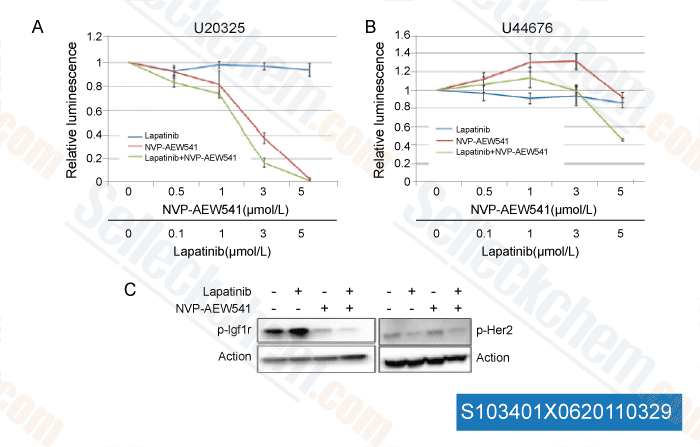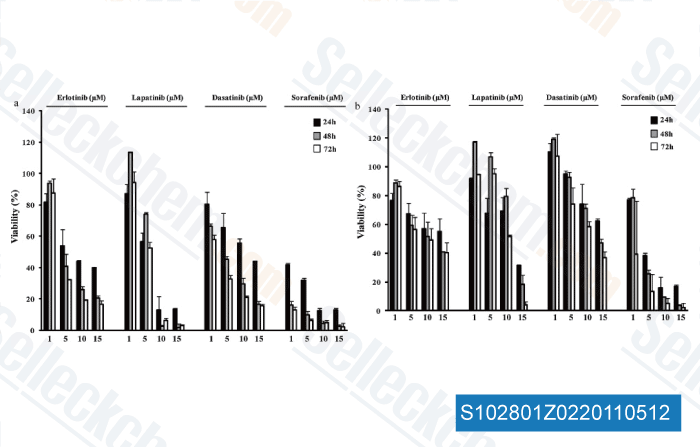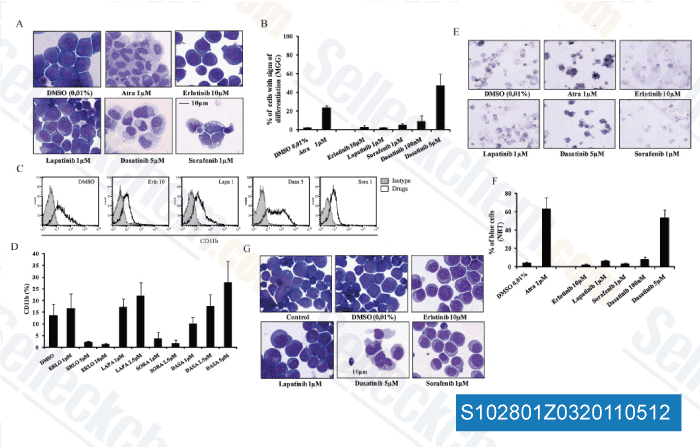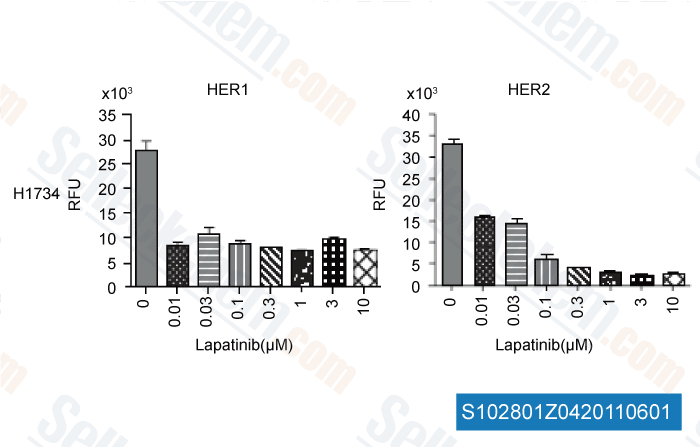|
Toll Free: (877) 796-6397 -- USA and Canada only -- |
Fax: +1-832-582-8590 Orders: +1-832-582-8158 |
Tech Support: +1-832-582-8158 Ext:3 Please provide your Order Number in the email. |
Technical Data
| Formula | C29H26ClFN4O4S.2C7H8O3S |
|||
| Molecular Weight | 925.46 | CAS No. | 388082-77-7 | |
| Solubility (25°C)* | In vitro | DMSO | 186 mg/mL (200.98 mM) | |
| Water | Insoluble | |||
| Ethanol | Insoluble | |||
|
* <1 mg/ml means slightly soluble or insoluble. * Please note that Selleck tests the solubility of all compounds in-house, and the actual solubility may differ slightly from published values. This is normal and is due to slight batch-to-batch variations. * Room temperature shipping (Stability testing shows this product can be shipped without any cooling measures.) |
||||
Preparing Stock Solutions
Biological Activity
| Description | Lapatinib Ditosylate is a potent EGFR and ErbB2 inhibitor with IC50 of 10.8 and 9.2 nM in cell-free assays, respectively. | ||||||
|---|---|---|---|---|---|---|---|
| Targets |
|
||||||
| In vitro | Lapatinib Ditosylate weakly inhibits the activity of ErbB4 with IC50 of 367 nM, and displays >300-fold selectivity for EGFR and ErbB2 over other kinases such as c-Src, c-Raf, MEK, ERK, c-Fms, CDK1, CDK2, p38, Tie-2, and VEGFR2. Lapatinib Ditosylate significantly inhibits receptor autophosphorylation of EGFR and ErbB2 in a dose-dependent manner with IC50 of 170 nM and 80 nM, respectively in HN5 cells; as well as 210 nM and 60 nM, respectively in BT474 cells. Unlike OSI-774 and Iressa (ZD1839) which preferentially inhibit the growth of the EGFR-overexpressing cells, Lapatinib Ditosylate inhibits the growth of both EGFR- and ErbB2-overexpressing cells. Lapatinib Ditosylate displays higher inhibitory activity against EGFR- or ErbB2-overexpressing cells with IC50 of 0.09-0.21 μM, compared with cells expressing low levels of EGFR or ErbB2 with IC50 of 3-12 μM, and exhibits ~100-fold selectivity over the normal fibroblast cells. Lapatinib Ditosylate potently inhibits the outgrowth of EGFR-overexpressing HN5 and A-431 cells, as well as ErbB2-overexpressing BT474 and N87 cells, and significantly induces G1 arrest of HN5 cells and apoptosis of BT474 cells, which are associated with inhibition of AKT phosphorylation. [1] | ||||||
| In vivo | Oral administration of Lapatinib Ditosylate (~100 mg/kg) twice daily significantly inhibits the growth of BT474 and HN5 xenografts in a dose-dependent manner. [1] |
Protocol (from reference)
| Kinase Assay:[1] |
|
|---|---|
| Cell Assay:[1] |
|
| Animal Study:[1] |
|
Customer Product Validation

-
Data from [Mol Cancer Ther, 2011, 10:697-707]

-
Data from [Biochem Pharmacol, 2011, 82, 1457-1466]

-
Data from [Biochem Pharmacol, 2011, 82, 1457-1466]

-
Data from [Int J Proteomics, 2011, 2011, 215496]
Selleck's Lapatinib Ditosylate has been cited by 151 publications
| Altered ribosomal profile in acquired resistance and reversal associates with pathological response to chemotherapy in inflammatory breast cancer [ NPJ Breast Cancer, 2024, 10(1):65] | PubMed: 39075068 |
| Profiling of ERBB receptors and downstream pathways reveals selectivity and hidden properties of ERBB4 antagonists [ iScience, 2024, 27(2):108839] | PubMed: 38303712 |
| Massively parallel reporter assays identify enhancer elements in oesophageal Adenocarcinoma [ NAR Cancer, 2024, 6(4):zcae041] | PubMed: 39417090 |
| Protocol for identifying properties of ERBB receptor antagonists using the barcoded ERBBprofiler assay [ STAR Protoc, 2024, 5(2):102987] | PubMed: 38635397 |
| Proteomic Assessment of SKBR3/HER2+ Breast Cancer Cellular Response to Lapatinib and Investigational Ipatasertib Kinase Inhibitors [ bioRxiv, 2024, 2024.04.02.587656] | PubMed: 38617302 |
| Overcoming brain-derived therapeutic resistance in HER2+ breast cancer brain metastasis [ bioRxiv, 2024, 2024.02.19.581073] | PubMed: 38529509 |
| Analysis and modeling of cancer drug responses using cell cycle phase-specific rate effects [ Nat Commun, 2023, 14(1):3450] | PubMed: 37301933 |
| HDAC Inhibition Restores Response to HER2-Targeted Therapy in Breast Cancer via PHLDA1 Induction [ Int J Mol Sci, 2023, 24(7)6228] | PubMed: 37047202 |
| Integrin αvβ3 Is a Master Regulator of Resistance to TKI-Induced Ferroptosis in HER2-Positive Breast Cancer [ Cancers (Basel), 2023, 15(4)1216] | PubMed: 36831558 |
| Oncogenic ERRB2 signals through the AP-1 transcription factor to control mesenchymal-like properties of oesophageal adenocarcinoma [ NAR Cancer, 2023, 5(1):zcad001] | PubMed: 36694726 |
RETURN POLICY
Selleck Chemical’s Unconditional Return Policy ensures a smooth online shopping experience for our customers. If you are in any way unsatisfied with your purchase, you may return any item(s) within 7 days of receiving it. In the event of product quality issues, either protocol related or product related problems, you may return any item(s) within 365 days from the original purchase date. Please follow the instructions below when returning products.
SHIPPING AND STORAGE
Selleck products are transported at room temperature. If you receive the product at room temperature, please rest assured, the Selleck Quality Inspection Department has conducted experiments to verify that the normal temperature placement of one month will not affect the biological activity of powder products. After collecting, please store the product according to the requirements described in the datasheet. Most Selleck products are stable under the recommended conditions.
NOT FOR HUMAN, VETERINARY DIAGNOSTIC OR THERAPEUTIC USE.
